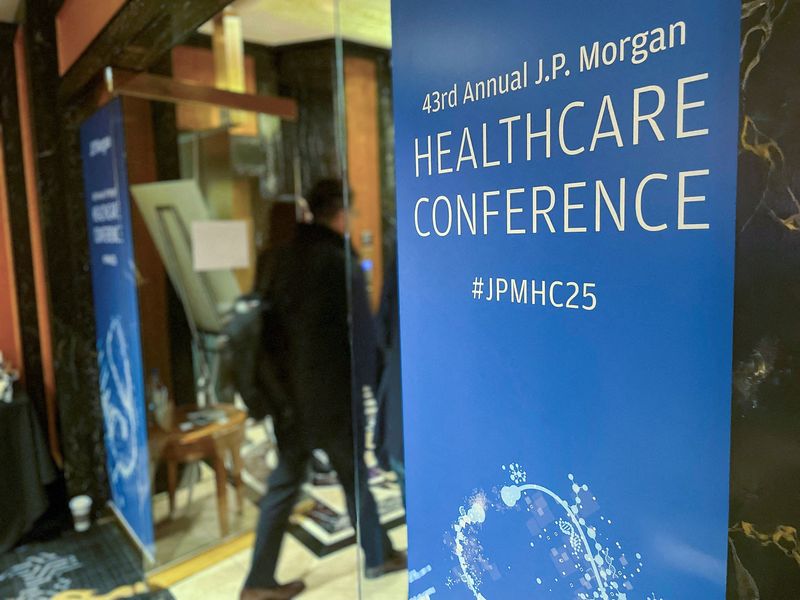By Sabrina Valle
NEW YORK (Reuters) – Healthcare dealmakers gathering in San Francisco for the industry’s premier annual conference this week say they expect a resurgence of deals exceeding $10 billion due to the potential for less antitrust scrutiny under President-elect Donald Trump.
About 8,000 executives, bankers and lawyers are due at the JPMorgan Healthcare Conference, which begins on Monday under heavier than usual security following the December murder of a UnitedHealth Group (NYSE:UNH) executive in New York outside the company’s annual investor meeting.
Seventeen healthcare dealmakers who spoke with Reuters were unanimously optimistic about a M&A recovery after last year seeing no transactions above $5 billion close in the sector for the first time in at least a decade.
Following Trump’s election to a second term in November, deals that had been shelved due to antitrust risk, high interest rates, or the decline in share values after the COVID-19 pandemic were getting a second look, bankers and lawyers said.
“Eventually the dam starts to break,” said Ben Carpenter, JPMorgan’s global co-head of healthcare investment banking. “I would expect to see at least a few deals that rise above $10 billion.”
While Trump’s healthcare policies are still uncertain, his nomination of a less stringent chair for the Federal Trade Commission was welcomed by dealmakers.
“What policy is ultimately going to be is unknown,” said Jeremy Meilman, who co-heads JPMorgan’s healthcare investment banking group. “What we do know is that the incoming administration does have a generally more pro-business stance.”
Yet, 14 out of the 17 bankers, lawyers and financial advisers consulted caution it may take more than a year for activity to return to its heyday of 2019 or 2021, when healthcare deals totaled half a trillion dollars, according to LSEG data. The market is waiting to see how a Trump administration will act towards healthcare, given his untraditional nominees for top positions.
“It’s not like the floodgates are back open,” said Shayne Kennedy, global chair of law firm Latham & Watkins’ Healthcare & Life Sciences Industry Group. “What we expect is that the tide is going to start to shift.”
Mergers and acquisitions activity in healthcare fell by about half in the past three years to $257 billion in 2024, according to LSEG data.
Of the $3.2 trillion in deals closed last year globally, the healthcare sector accounted for only 8%, with M&A partially discouraged by a tougher antitrust stance from the Biden administration, as well as companies reluctant to sell at depressed valuations.
‘A VERY GOOD OUTCOME’
Over the course of the last six to nine months and coming into 2025, companies with strong earnings have recovered to levels that allow for dealmaking, said Devin O’Reilly, head of healthcare North America at Bain Capital.
“It may not be the ideal price people were thinking, but it’s a normal multiple that they can sell this year and have a very good outcome,” he said.
Traditional buyers like Merck & Co (NYSE:MRK), which a year ago was looking for up to $15 billion deals, held off on big acquisitions.
Now, Merck (NS:PROR) and competitors like Bristol Myers (NYSE:BMY) Squibb, Johnson & Johnson (NYSE:JNJ) and Pfizer (NYSE:PFE) have less time to fill revenue holes that will be left by big-selling medicines going off patent. &j>
Drugs like Merck’s cancer immunotherapy Keytruda, not long ago the world’s top-selling prescription medicine, Bristol Myers’ rival treatment Opdivo, and the blockbuster blood thinner Eliquis it shares with Pfizer will face competition from cheaper generic versions this decade.
A macroeconomic environment in which inflation is under control and declining interest rates favor financing will spur more and bigger deals in 2025, those on the M&A front lines said, adding that they expect hundreds of biotech companies to be available or targeted for sales this year.
Private equity firms with cash to spend are expected to be big players in hot areas like technology and artificial intelligence, which are seen as more insulated from regulatory constraints.
They typically need to sell assets every five years to return profits to investors and have been looking to dispose of those acquired since the coronavirus pandemic, they say.
They and strategic buyers in healthcare are expected to focus on medicines for heart and metabolic conditions, nervous system disorders, immune system disorders, and the particularly lucrative oncology and rare diseases spaces.
The new generation of weight-loss drugs is also likely to be in the deal crosshairs, with analysts forecasting that market reaching as high as $200 billion by 2031. A company with a pill as effective as the popular injected drugs would be especially attractive.
“If you can get one that really works,” Latham’s Kennedy said, “it is going to be a bit of the Holy Grail.”





























